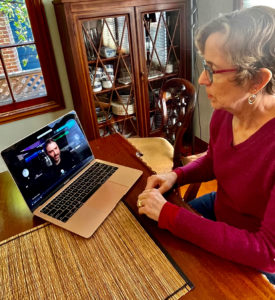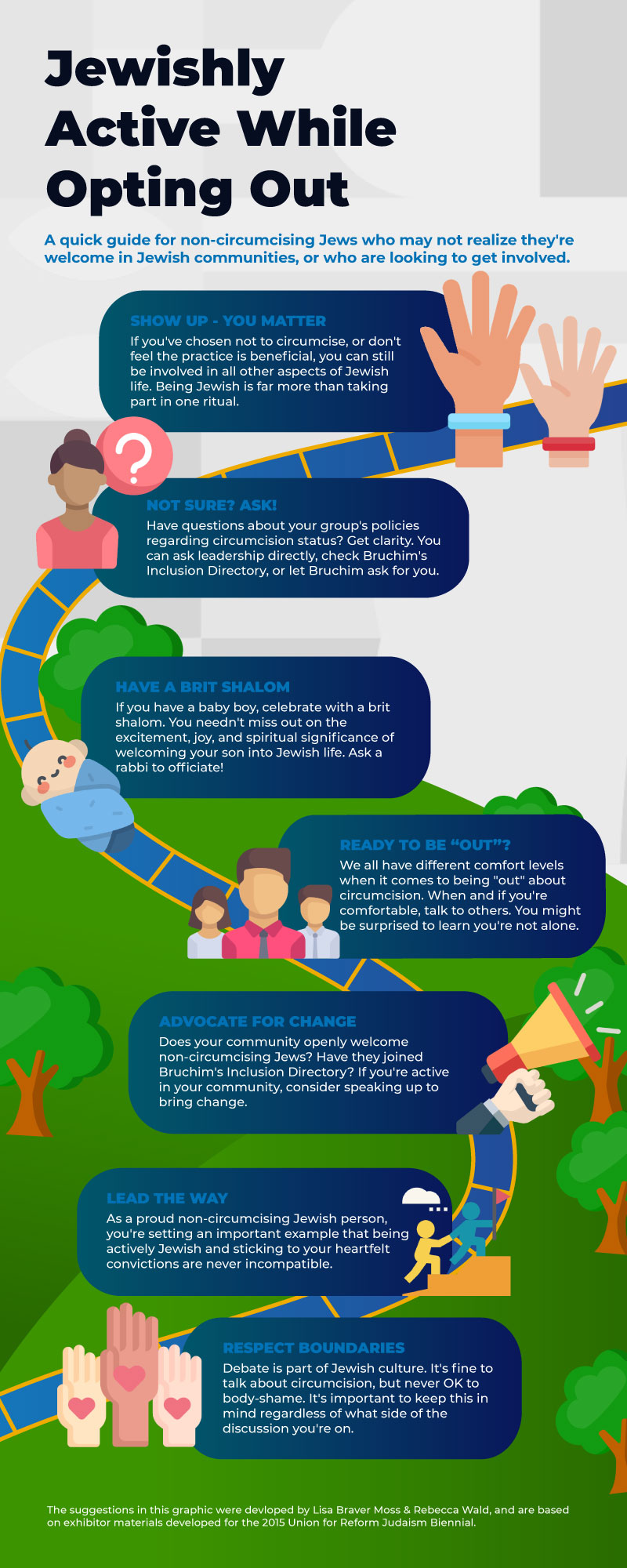Bruchim’s all-volunteer team is enthusiastic about fostering spaces where everyone is valued.
The journey to get here has been long — but it’s only just the beginning.
Bruchim was incorporated as a 501(c)3 non-profit by Lisa Braver Moss, Rebecca Wald and Eliyahu Ungar-Sargon, but its vital spark extends well beyond our three-person founding board. The energy and inspiration come from the entire all-volunteer leadership team, as well as a broader cadre of involved individuals. The organization’s general and rabbinic advisory councils further support our mission, offering sound ideas and specific advice to ensure that Bruchim will have a bright and impactful future.
Conceptualization
The idea for Bruchim grew out of a question that Bruchim’s President, Lisa, asked of her own Reform congregation, Temple Sinai in Oakland, CA. Are non-circumcising Jews welcome in Jewish life and, if so, how can that welcome be extended in an open and meaningful way? When Temple Sinai responded with an enthusiastic yes — adding wording to its website’s lifecycles page explicitly acknowledging the decision not to circumcise — Lisa was determined to broaden the dialogue beyond her own synagogue.

Lisa Braver Moss and Eliyahu Ungar-Sargon meet over Zoom to discuss website launch plans.
Lisa had been exploring the issue of Jewish circumcision for decades after reluctantly agreeing to circumcise her sons in the late 1980s. She began writing articles and lecturing, questioning circumcision from a Jewish point of view, and penned The Measure of His Grief, a novel about a Berkeley doctor, his Jewish identity, and the circumcision controversy. In 2015 she collaborated with Rebecca Wald in the writing of Celebrating Brit Shalom, a guidebook of alternative bris ceremonies, with accompanying original music.
Rebecca became engaged in this issue following the birth of her son, whom she did not circumcise. Hoping to spark conversation and make the Jewish world more welcoming for her child and those like him, she launched Beyond the Bris, a forum for Jewish people questioning circumcision. The site has been widely profiled and remains a go-to place for connection-building and the sharing of personal experiences and viewpoints regarding Jewish circumcision.
Meanwhile, Eliyahu, who grew up Orthodox, had raised important questions about circumcision and Jewish identity in his groundbreaking documentary Cut: Slicing Through the Myths of Circumcision (2007). Eli continues to be a leading scholar and ethicist on Jewish circumcision as well as many other subjects; writing, speaking, and publicly debating issues that go to the heart of what it means to be a caring human being. When it came time to forming Bruchim’s founding board, Eli was a perfect fit.
Conversations about the need for welcoming and inclusion came to the forefront following the publication of Celebrating Brit Shalom. As the authors connected with families and clergy, they realized the parental decision to opt out was often just the beginning. Many such families had concerns about Jewish involvement going forward.
UJR Conference
The 2015 Union for Reform Judaism biennial conference seemed like an ideal venue to raise the subject, especially since that year’s theme was “audacious hospitality.” Lisa applied to be a speaker but her proposal was declined. Lisa and Rebecca decided to take the message to the conference anyhow — as paying exhibitors.
Flanked by posters of non-circumcising families across the U.S. that said “Count Us In!” and written testimonials from rabbis expressing support for inclusion, the booth was a popular stop in the exhibitor hall. A handout giving concrete suggestions to synagogues for actively welcoming non-circumcising families flew off the table. In the years that followed, Rebecca and Lisa would often discuss plans for an advocacy organization based on their conference handout and the many conversations they were having with families.
Covid Lockdown
It wasn’t until the initial coronavirus lockdown that the idea was put into action. Many new young couples, families, and individuals who recognized the need for such an organization were eager to roll up their sleeves. Online conferencing provided a means for bringing them together. Today, Bruchim’s advocates and volunteers continue to “meet” regularly across countries and time zones. If you’d like to attend Bruchim meetings, consider joining Bruchim’s Chaverim.


